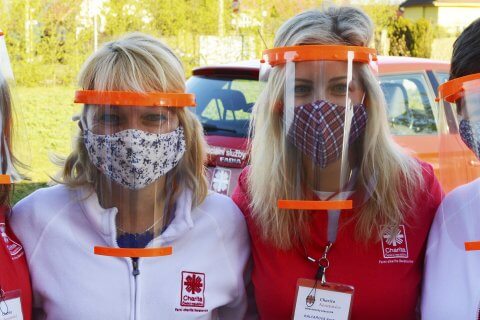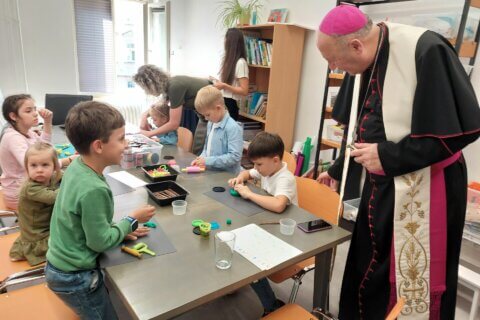The pandemic came like a deluge. We had to respond to new developments on a daily basis.

The spring of this year was one of the most demanding times in the recent history of Caritas. JAROSLAV NĚMEC, Director of the Caritas of the Archdiocese of Prague, likens the pandemic to a 100-year flood.
What impact has the coronavirus pandemic had on the work of Caritas?
That would be a long story, but I’ll try to give you a short answer. We had to respond quickly, just like we did during the 100-year flood in 2002. Things were changing overnight. The measures affected all of our social services. In addition, our help was sought by people who never turned to Caritas before. We were contacted by single mothers, people who lost their job, independent contractors. Many people who found themselves with no income came to us for food and financial aid. At the same time, the crisis brought a huge wave of solidarity. People were donating protective personal equipment and chipped in during fundraising efforts both in the Czech Republic and in other countries. I want to thank everyone for their help.
How did you cope with the situation with regard to specific social services?
Our workers were put under extreme pressure. The situation underscored the fact that the people whom we assist come from some of the most vulnerable groups in our society.
We introduced the strictest possible measures in senior citizen homes. One of our homes in a municipality where the infection begin spreading decided to voluntarily quarantine itself. The staff stayed with the senior residents for two months without leaving the facility, until the sick people in the town recovered. They worked 14-day shifts. Their replacement could only come after obtaining negative test results.
We opened a new service for homeless people, a tent city that allowed them to get off the street. Field services were overwhelmed, unable to respond to the rise in interest in their services. They used a large number of volunteers who were helping elderly citizens with shopping.
At the beginning of the crisis, the media were highlighting certain professions whose work was deemed essential. Social workers were not among them.
I know. It shows that social work remains insufficiently appreciated in society, despite the fact that there are hundreds of thousands of people who rely on our assistance. Staff in senior citizen homes and workers who assisted disabled individuals, people in shelters, dormitories, care services, and personal assistance – they were all on the front line. They all had to continue working, because they provide essential care. Schools and most shops can be closed for a week or two. But you cannot shut down a senior citizen home. Likewise, it is unimaginable that social workers who help elderly people living alone with shopping, washing, and taking care of their households would stop working. The same goes for other social services.
You mentioned help in other countries. Caritas paid attention to that area during the pandemic as well.
Developing countries are much more vulnerable. Their healthcare systems are lacking in many ways. Large numbers of poor people depend on income from irregular odd jobs. In India, a nationwide lockdown nearly resulted in a humanitarian crisis before the government realized the severity of the situation and eased the restrictions. We distributed food aid and personal protective equipment to people in need in all regions where Caritas is present. Without our help, there was a risk of famine.
What was your personal life like during the pandemic?
It was a time of very hard work. I want to thank all of the workers who did not succumb to fear and carried on, often working even harder than usual despite all the obstacles. It was not easy.
I, personally, was quarantined at home for a week. I met Bishop Karel Herbst a few days before he was taken to a hospital. Thank God he overcame the illness, in his case rather severe, and he has now recovered.
I thank everyone who has helped us, no matter what their help has been. Be it a prayer. Be it encouragement. Be it a donation. We greatly value everyone’s contribution.
Help those who are in need
„One who is gracious to a poor man lends to the Lord, And He will repay him for his good deed.“ (Proverbs 19:17)
Your donation:
- funds food aid and shelter for those who are in need,
- supports social services for seniors, people with special needs, families in need, victims of domestic violence and those who have found themselves in a life burdening situation
- supports education for disadvantaged children in developing countries.
Donate now
You can donate one-time or become a sustaining donor. Donations of any amount are accepted and greatly appreciated!
Thank you for your support!
Donate now.




